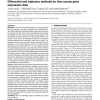Free Online Productivity Tools
i2Speak
i2Symbol
i2OCR
iTex2Img
iWeb2Print
iWeb2Shot
i2Type
iPdf2Split
iPdf2Merge
i2Bopomofo
i2Arabic
i2Style
i2Image
i2PDF
iLatex2Rtf
Sci2ools
131
click to vote
BIOINFORMATICS
2005
2005
Differential and trajectory methods for time course gene expression data
Motivation: The issue of high dimensionality in microarray data has been, and remains, a hot topic in statistical and computational analysis. Efficient gene filtering and differentiation approaches can reduce the dimensions of data, help to remove redundant genes and noises, and highlight the most relevant genes that are major players in the development of certain diseases or the effect of drug treatment. The purpose of this study is to investigate the efficiency of parametric (including Bayesian and non-Bayesian, linear and non-linear), nonparametric and semi-parametric gene filtering methods through the application of time course microarray data from multiple sclerosis patients being treated with interferon--1a. The analysis of variance with bootstrapping (parametric), class dispersion (semi-parametric) and Pareto (non-parametric) with permutation methods are presented and compared for filtering and finding differentially expressed genes. The Bayesian linear correlated model, the Ba...
Related Content
| Added | 15 Dec 2010 |
| Updated | 15 Dec 2010 |
| Type | Journal |
| Year | 2005 |
| Where | BIOINFORMATICS |
| Authors | Yulan Liang, Bamidele Tayo, Xueya Cai, Arpad Kelemen |
Comments (0)

